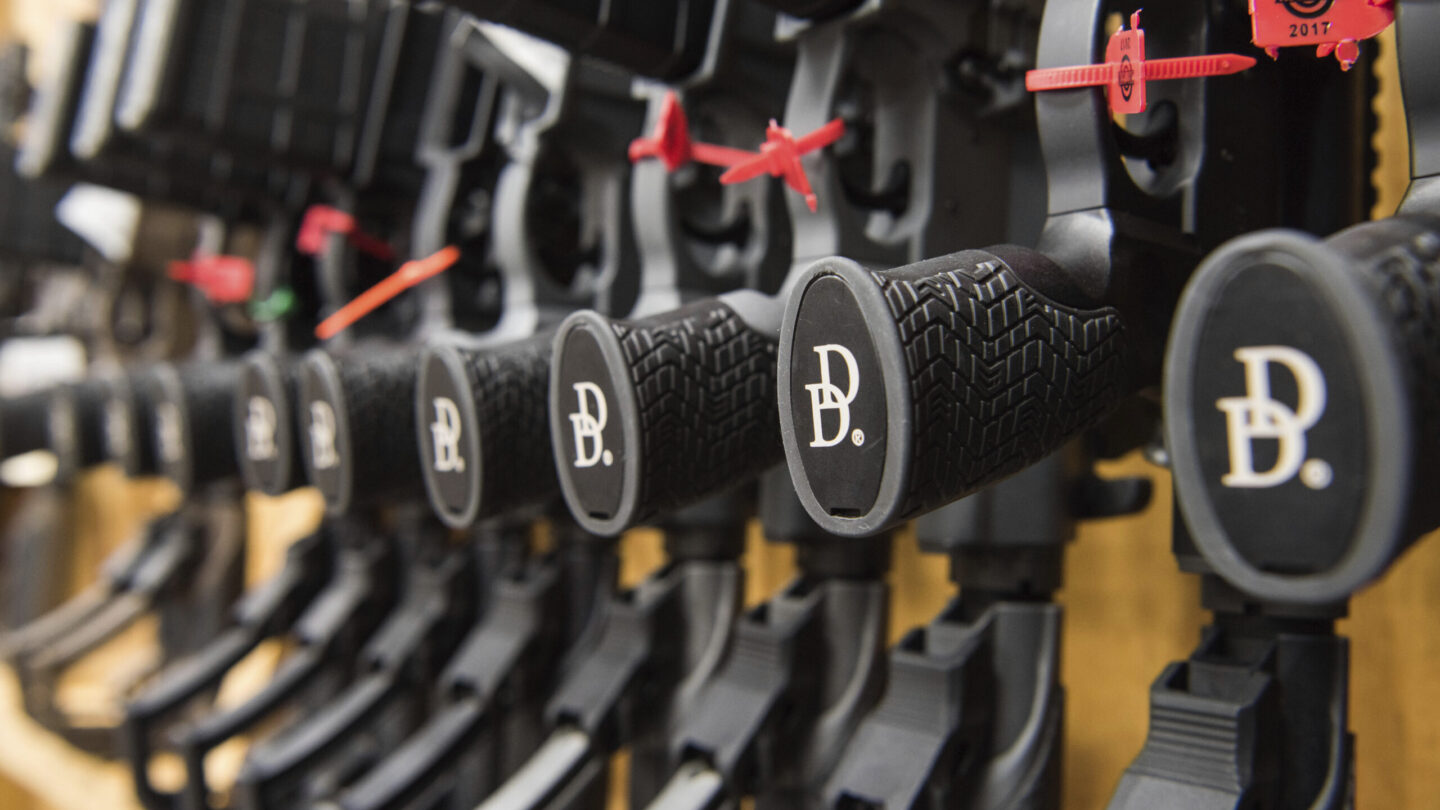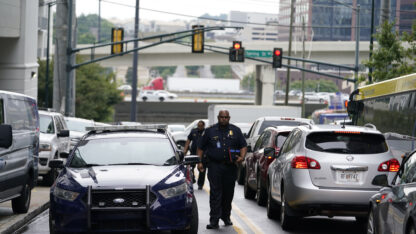AP-NORC poll: Most in US say they want stricter gun laws

The gunman in the May 24, 2022 mass shooting at Robb Elementary in Uvalde, Texas, purchased an AR-15 style rifle from Georgia-based Daniel Defense online. (AP Photo/Lisa Marie Pane)
Lisa Marie Pane / Lisa Marie Pane
Most U.S. adults want to see gun laws made stricter and think gun violence is increasing nationwide, according to a new poll that finds broad public support for a variety of gun restrictions, including many that are supported by majorities of Republicans and gun owners.
The poll by the University of Chicago Harris School of Public Policy and The Associated Press-NORC Center for Public Affairs Research shows 71% of Americans say gun laws should be stricter, including about half of Republicans, the vast majority of Democrats and a majority of those in gun-owning households.
The poll was conducted between July 28 and Aug. 1, after a string of deadly mass shootings — from a New York grocery store to a school in Texas and a July 4 parade in Illinois — and a 2020 spike in gun killings that have increased attention on the issue of gun violence. Overall, 8 in 10 Americans perceive that gun violence is increasing around the country, and about two-thirds say it’s increasing in their state, though less than half believe it’s increasing in their community, the poll shows.
The question of how to prevent such violence has long divided politicians and many voters, making it difficult to change gun laws. In June, a conservative majority on the Supreme Court expanded gun rights, finding a constitutional right to carry firearms in public for self-defense.
Later that same month, President Joe Biden signed a bipartisan gun safety bill. The package, approved in the wake of shootings like the one that killed 19 children and two teachers in Uvalde, Texas, was both a measured compromise and the most significant bill addressing gun violence to be approved in Congress in decades — an indication of how intractable the issue has become.
The poll finds that majorities of U.S. adults view both reducing gun violence and protecting gun ownership as important issues.
Nicole Whitelaw, 29, is a Democrat and gun owner who grew up hunting and target shooting in upstate New York with her strongly Republican family. Whitelaw, who now lives along Florida’s Gulf Coast, supports some gun restrictions, such as prohibiting people convicted of domestic violence from owning firearms and a federal law preventing mentally ill people from purchasing guns.
She said other restrictions — such as banning sales of AR-15 rifles — are “going too far” and may not solve the problem. Whitelaw pointed to the the early days of the COVID-19 pandemic, when many people bought up all the toilet paper they could find.
“I think people would start trying to hoard guns,” she said, adding that a better approach is to make smaller changes and see what impact they have.
The poll shows bipartisan majorities of Americans support a nationwide background check policy for all gun sales, a law preventing mentally ill people from purchasing guns, allowing courts to temporarily prevent people who are considered a danger to themselves or others from purchasing a gun, making 21 the minimum age to buy a gun nationwide and banning those who have been convicted of domestic violence from purchasing a gun.
A smaller majority of Americans — 59% — favor a ban on the sale of AR-15 rifles and similar semiautomatic weapons, with Democrats more likely to support that policy than Republicans, 83% vs. 35%.
Chris Boylan, 47, from Indianapolis, opposes restrictions on guns. As a teacher for many years, Boylan said he has “buried more kids than I care to count” and believes gun violence is a major problem. But the Republican, who said he leans more toward Libertarian in his personal stances, believes the issue is more about mental health and a too-lenient criminal justice system.
“Blaming the gun is an oversimplification of what the issues really are,” Boylan said. “It’s not the gun. It’s a hearts-and-minds issue to me.”
The new poll finds 88% of Americans call preventing mass shootings extremely or very important, and nearly as many say that about reducing gun violence in general. But 60% also say it’s very important to ensure that people can own guns for personal protection.
Overall, 52% of Americans — including 65% of Republicans and 39% of Democrats — say both reducing mass shootings and protecting the right to own guns for personal protection highly important.
University of Chicago professor Jens Ludwig said the poll’s findings show that concerns raised by opponents of gun restrictions are “very off base.” Led by the National Rifle Association, the gun lobby argues that any new limitations on who may have a gun or what type of firearms may be sold will lead to nationwide bans on all weapons and ammunition.
The poll showed most Americans’ opinions are more nuanced and there is support for some changes even among Republicans, who as elected officials typically oppose gun control, said Ludwig, who also is director of the University of Chicago’s Crime Lab.
“It should shut the door to some of the ‘slippery slope’ arguments,” he said.
The poll also found that only about 3 in 10 Americans support a law allowing people to carry guns in public without a permit. Seventy-eight percent of Democrats are opposed. Among Republicans, 47% are in favor and 39% are opposed.
Ervin Leach, 66, lives in Troutman, North Carolina, north of Charlotte, believes gun violence is a major problem and says that laws should be much more strict. A Democrat, Leach said he supports measures like background checks — or what he said should be “in-depth studies” — and a minimum age of 21 to buy a gun.
The poll found 1 in 5 people have experienced gun violence themselves in the last five years, such as being threatened with a gun or a shooting victim, or had a close friend or family member who has. Black and Hispanic Americans are especially likely to say that they or someone close to them has experienced gun violence.
Leach, who is Black, said the gun violence he sees in the news has made him more cautious.
“I don’t like people approaching me,” he said. “It used to be if someone was on the side of the road, you’d stop to help. Now, you go to help somebody, you might lose your life.”
All the killings have caused Leach to contemplate buying a gun for his own protection. While he hasn’t had a chance yet to get his gun permit, he said, “That is my intention.”
AP Polling Reporter Hannah Fingerhut in Washington contributed to this report.
The poll of 1,373 adults was conducted July 28-Aug. 1 using a sample drawn from NORC’s probability-based AmeriSpeak Panel, which is designed to be representative of the U.S. population. The margin of sampling error for all respondents is plus or minus 3.8 percentage points.
Follow AP’s coverage of gun violence at https://apnews.com/hub/gun-violence.








